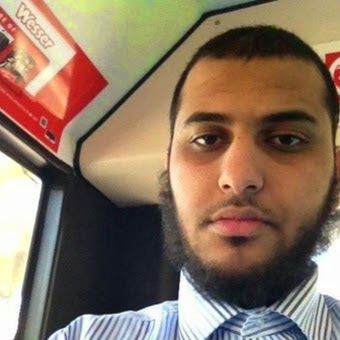Cardiff has an ongoing problem with the radicalisation of young Muslims, said an academic who has studied the issue.
Two men from the city have been identified taking part in what appears to be a Jihadist recruiting video, which was posted online last week.
It is thought Reyaad Khan travelled to Syria with friend Nasser Muthana who also appears in the footage.
Khan lived close to the Cardiff men jailed over the London Stock Exchange bombing plot in 2012.
It is believed the two men, both 20, travelled to Syria in November, while Nasser Muthana's younger brother Aseel, 17, travelled to the country in February.
The men are believed to be among 500 Britons fighting in the conflict in Syria.
Reyaad Khan's family is said to be frustrated that more could not be done by the authorities in the UK to bring him home.
Dr Suraj Lakhani, of Cardiff University, who recently completed his doctorate - A Social Analysis of Radicalisation in the UK, told BBC Radio Wales: "As far as I'm aware, there has been a big issue in Cardiff for a while now.
"This is a concern that has been raised not only by the intelligence services and the Welsh government, but also South Wales Police and local Muslim communities.
"People have been saying that something needs to be done in Cardiff, they need support.
"There has been a threat for a while as there has been in other parts of the country as well. Yes, there has been a threat and it's still ongoing."
He said he believed the internet played a "big role" in radicalisation but there was also "face to face interaction", although not from the mosques.
In the video posted by internet accounts linked to militants from the Islamic State of Iraq and the Levant (Isis), Reyaad Khan, who went to Cantonian High School and St David's Catholic College in Cardiff, is seen holding a gun and sitting next to his friend Nasser Muthana.
Nasser Muthana - who has been offered places to study medicine by four universities - appears in the footage, using the name Abu Muthanna al-Yemen and urging others to fight in Syria and Iraq.
His father, Ahmed Muthana, said his son - who he described as quiet, well-educated and intelligent - had left the UK to fight in Syria in November.
The families of the men believe they have been brainwashed.
It is not the first time fears have been raised about the radicalisation of young Muslims in Cardiff.
• In February 2012, a Welsh Muslim think-tank said more must be done to tackle extremism after two Cardiff brothers were jailed for plotting to bomb the Stock Exchange. South Wales Police said at the time they recognised the trial may have raised concerns about extremism in Cardiff and elsewhere
• Also in February that year, a man was jailed for eight months after threatening to shoot police and council officials at an anti-terror raid on a Muslim meeting in Cardiff
• Then in October 2012, BBC Wales' Week In Week Out programme revealed a group of Islamic extremists in Cardiff had been involved in trying to radicalise a young Muslim
• In October 2011, two Cardiff teenagers were released without charge by police after being deported from Kenya over suspected links to Somali militants
• A Cardiff man was accused last year of posting a string of terrorist publications on Facebook. He later pleaded plead guilty to dissemination of terrorist publications
Reyaad Khan lived close to the Cardiff men jailed over the London Stock Exchange plot, with the Daily Telegraph reporting that Reyaad Khan grew up in the same street in Riverside as Abdul Miah, one of the ringleaders of the plot.
The Stock Exchange plotters - nine men in total also from London and Stoke-on-Trent - had planned to raise funds for a terrorist camp in Pakistan and recruit Britons to attend.
Sheikh Zane Abdo from the South Wales Islamic Centre in Cardiff, who knows Nasser Muthana and his brother, has also said he believes there is a problem with extremism in Cardiff.
He said he believed "a certain amount of radicalisation" could occur online.
"It very simple, very easy for a person just to click on (it) and become radicalised over a long period of time," he told BBC News.
"The fact that the video they've shown... I guarantee many young people who are susceptible to this kind of message will have watched the video and maybe (be) encouraged to follow in the footsteps of Nasser and his brother.
"A platform has been given to this video which really shouldn't have been given.
"So there's issues around the internet and issues around people who can radicalise, can talk to young people."
He said the pair had been normal teenagers before they went through a "very strange period" when they started expressing "certain views".
Dr Lakhani said there were several reasons why young men may be willing to risk their lives abroad.
"It's really a combination of humanitarian concerns, a feel for having a duty towards their religion, towards their Muslim kin, and some personal reasons as well," he said.
"It's about leaving your formerly mundane and predictable life to search... for brotherhood and some sort of identity, masculinity and action abroad."
Mohammed Sarul Islam, a former Riverside councillor who knows the Khan family, agreed that radicalisation was happening "under people's noses".
He said it was better to try to solve the problem rather than blaming communities or individual organisations.
He added: "The family's only hope is they get any government-level help (to bring their son home).
"The mother is crying her eyes out... all the time she is urging through the media, through whatever source possible, asking him to come back home."
BBC


No comments:
Post a Comment